- Témaindító
- #1
- Csatlakozás
- 2022.08.02.
- Üzenetek
- 24,332
- Reakció pontszám
- 332
- Díjak
- 6
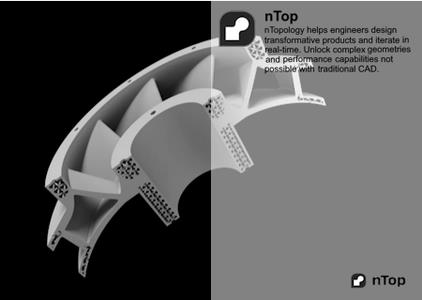
Free Download nTopology 4.11.2 | 1.6 Gb
Owner:nTopology
Product Name:nTopology
Version:4.11.2
Supported Architectures:x64
Website Home Page :
Code:
⚠
A kód megtekintéséhez jelentkezz be.
Please log in to view the code.
System Requirements:Windows *
Size:1.6 Gb
The Team nTopology is pleased to announce the availability ofnTopology 4.11.2. This release features usage improvements and block updates.
Usage Improvements
- The block input you've selected in the notebook will now be highlighted on the Right Side Panel to help guide you to its location.
- The Right Side Panel now displays the colored tags and icons to help you form stronger associations for each type.
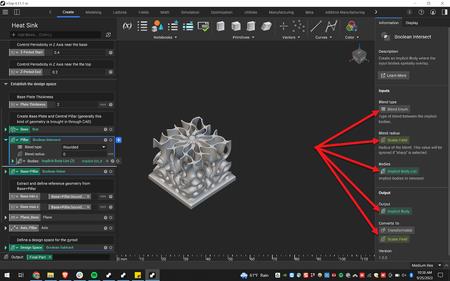
- We added Volumetric heat generation and Convection coefficient to the list of Compound units in the Settings > Units menu. The Volumetric Heat Generation block and the Convection Boundary Load blocks will utilize these units for their inputs.
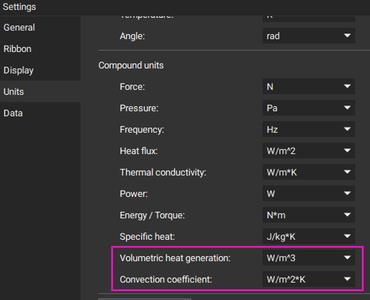
- Switching away from and back to an overload with pre-populated default values will now re-populate those default values.
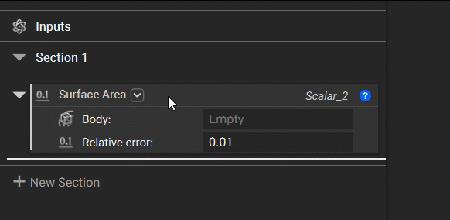
Block Updates
We promoted the following blocks from beta to production version 1.0.0:
-Associate FE Mesh:Associates an FE Mesh with a CAD Body. Boundary Conditions applied to the CAD Body will then be transferred to the associated FE Mesh. This block can be found in the Simulation ribbon under the Mesh tab.
-Region by Body:Identifies an Implicit Body to intersect with an FE Mesh to select a subset of elements. This block can be found in the Simulation ribbon under the Utilities tab.
-Boundary by Body:Identifies an Implicit Body to intersect with an FE Mesh to select faces, edges, or nodes on the mesh boundary. This block can be found in the Simulation ribbon under the Utilities tab.
We released the block overload that takes a CAD Face List input for the following boundary condition and connector blocks from beta to production version 1.0.0:
-Force
- Displacement Restraint
- Bearing Force
- Convection Boundary Load
- Point Force
- Point Moment
- Point Restraint
- Pressure
- Structural Bonded Contact
- Surface Force
- Surface Heat Flux
- Temperature Restraint
- Thermal Bonded Contact
- Cylindrical Restraint
We updated the Topology Optimization and Field Optimization blocks to update the convergence graphs in the Display panel while the blocks are running as variables

We updated the Mesh Quality block to enable users to zoom into the location of intersecting elements (either using the 'Z' hotkey or from the View > Zoom to selected option) while in the Intersecting Elements view. We also added an option to toggle between the elements that are a part of the intersection to allow users to zoom into these selected elements while investigating the model. Users can also enter the intersection number to visualize the element on the screen.
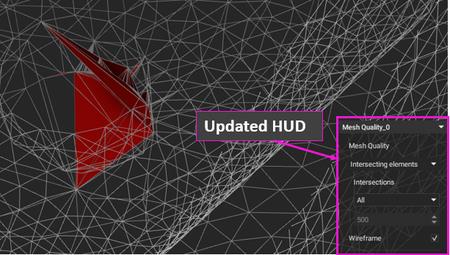
Bug Fixes
- We fixed an issue with not being able to import a valid Custom Block of "Unknown" type into a notebook.
- We fixed an issue with the Rigid Connector block where the point mass used in the FE Model was ignored in a Topology Optimization analysis when the Connector input was set to 'Flexible'.
- We fixed a numerical precision issue that was impacting the following blocks:
. Evaluate Field
. Evaluate Field Gradient
. Mesh from Implicit Body when the Sharpen input is selected, or Sharpen Iterations is greater than 0.
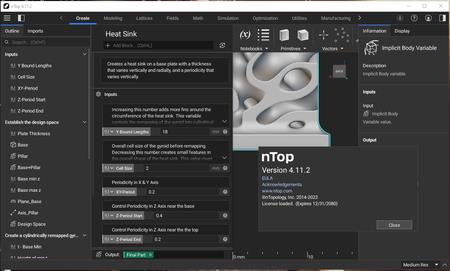
nTopologyintroduced the concept of implicit modeling for mechanical design, which is an innovative, modern, and scalable way define parts and products. It has many benefits to end-users and companies, such as the elimination of model failures, speed of changes or iterations, and scalability to name a few. But implicit modeling enables so much more. In this informational session, we'll explore a topic that is redefining product development - field-driven design. In short, field-driven design is a way for design, analysis, and manufacturing teams to overlay information into one engineering model. This approach enables orders of magnitude increase in design iteration speed and greatly improves collaboration between teams.
How Field-Driven Design Allows Engineers to Design for Additive Manufacturing
Watch this information session where we'll define field-driven design, show examples of how it enables better knowledge sharing, and show how it promotes the development of more sophisticated, highly engineered products. You'll also better understand how nTopology is addressing today's engineering problems through its nTop Platform product.
nTopologywas founded in 2015 to enable engineers and designers to create any geometry - no matter how complex - and meet the requirements of high-performance products.
Recommend Download Link Hight Speed | Please Say Thanks Keep Topic Live
Code:
⚠
A kód megtekintéséhez jelentkezz be.
Please log in to view the code.
